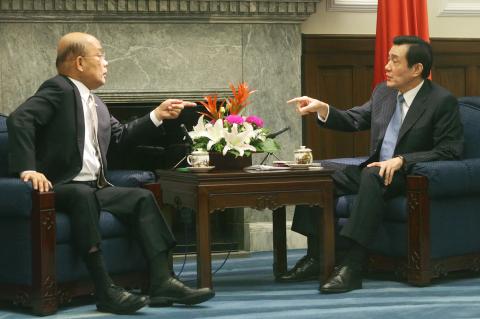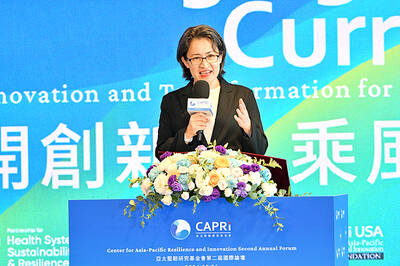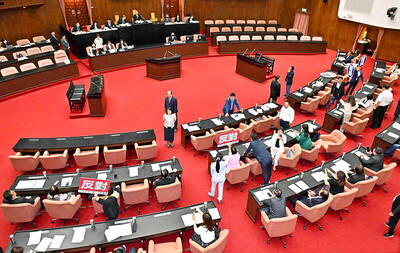President Ma Ying-jeou (馬英九) and Democratic Progressive Party (DPP) Chairman Su Tseng-chang (蘇貞昌) yesterday engaged in a heated discussion over the fate of the Fourth Nuclear Power Plant, but failed to reach any consensus during the 90-minute talk.
Ma said the nearly completed plant in New Taipei City’s Gongliao District (貢寮) must be finished so it can be “maintained in operable condition.”
“That way, we will have an operable nuclear power plant that can be put into operation when we need it. If construction is terminated now, the plant will be scrapped,” Ma said in response to Su’s urging that the plant be stopped.

Photo: CNA
The two men met at the Presidential Office, while former DPP chairman Lin I-hsiung (林義雄) entered the fourth day of what he has said will be an infinite hunger strike to back calls to terminate the project, as mainstream public opinion demands.
Su suggested two ways to end the plant project, but both were rejected by Ma.
Su first suggested that the Executive Yuan announce a halt to the plant and present a report on the decision to the legislature for approval, although it is a constitutionally allowed way for a change to major policy.
Both the DPP, which was in power for eight years, and the Chinese Nationalist Party (KMT) are responsible for the project, which has been a source of controversy for more than three decades, Su said.
“Let us together resolve the issue,” the DPP leader said.
“If you want, in line with the [Council of Grand Justices’] Constitutional Interpretation [No. 520], the Executive Yuan can propose to the legislature to stop the plant,” Su said.
However, Ma said that when the DPP administration called a halt to building the facility in October 2000, the stock market plummeted from 6,400 to 4,600 points and stayed down for three straight months.
He “would rather not repeat that mistake,” Ma said.
“It would have too much of a [negative] impact on society,” he said.
Terminating the project now would also create a massive waste of money, given the estimated NT$280 billion (US$9.23 billion) that has been invested in the project over three decades, he added.
“We cannot waste money like that. The construction of the plant ought to be completed. Installing fuel rods in the plant’s reactors is also part of the construction process,” the president said.
Su said it would cost the nation NT$46 billion more to complete the plant, in addition to the cost of conducting safety checks.
Su also brought up putting the fate of the plant to a national referendum, which Ma said he agreed with.
However, Ma declined to promise that as KMT chairman he would not use party disciplinary measures to demand that KMT lawmakers toe the party line on issues related to referendum thresholds.
If the nuclear issue is put to a referendum, thresholds lower than those specified in the Referendum Act (公民投票法) should be applied to the vote, if it is not decided by a simple majority, Su said.
That none of the six national referendums held so far have seen a voter turnout of over 50 percent, as required under the 2004 act for a referendum to be valid, has proved that it was a “bird cage” law that dooms any referendum to fail, Su said.
“Chairman Su, have you used party discipline to force DPP lawmakers to vote for the party’s policy? Have you?” Ma said.
“Every party has its discipline. You cannot ask me not to impose party discipline on KMT lawmakers if you do not abstain from the use of party discipline as well,” he said.
Su suggested that the KMT, the DPP, the Taiwan Solidarity Union and the People First Party jointly facilitate legislative passage of a special statute for a referendum on the nuclear issue to be held under a fair referendum system.
The president said he would consult with KMT lawmakers.

NO-LIMITS PARTNERSHIP: ‘The bottom line’ is that if the US were to have a conflict with China or Russia it would likely open up a second front with the other, a US senator said Beijing and Moscow could cooperate in a conflict over Taiwan, the top US intelligence chief told the US Senate this week. “We see China and Russia, for the first time, exercising together in relation to Taiwan and recognizing that this is a place where China definitely wants Russia to be working with them, and we see no reason why they wouldn’t,” US Director of National Intelligence Avril Haines told a US Senate Committee on Armed Services hearing on Thursday. US Senator Mike Rounds asked Haines about such a potential scenario. He also asked US Defense Intelligence Agency Director Lieutenant General Jeffrey Kruse

INSPIRING: Taiwan has been a model in the Asia-Pacific region with its democratic transition, free and fair elections and open society, the vice president-elect said Taiwan can play a leadership role in the Asia-Pacific region, vice president-elect Hsiao Bi-khim (蕭美琴) told a forum in Taipei yesterday, highlighting the nation’s resilience in the face of geopolitical challenges. “Not only can Taiwan help, but Taiwan can lead ... not only can Taiwan play a leadership role, but Taiwan’s leadership is important to the world,” Hsiao told the annual forum hosted by the Center for Asia-Pacific Resilience and Innovation think tank. Hsiao thanked Taiwan’s international friends for their long-term support, citing the example of US President Joe Biden last month signing into law a bill to provide aid to Taiwan,

China’s intrusive and territorial claims in the Indo-Pacific region are “illegal, coercive, aggressive and deceptive,” new US Indo-Pacific Commander Admiral Samuel Paparo said on Friday, adding that he would continue working with allies and partners to keep the area free and open. Paparo made the remarks at a change-of-command ceremony at Joint Base Pearl Harbor-Hickam in Hawaii, where he took over the command from Admiral John Aquilino. “Our world faces a complex problem set in the troubling actions of the People’s Republic of China [PRC] and its rapid buildup of forces. We must be ready to answer the PRC’s increasingly intrusive and

STATE OF THE NATION: The legislature should invite the president to deliver an address every year, the TPP said, adding that Lai should also have to answer legislators’ questions The Chinese Nationalist Party (KMT) yesterday proposed inviting president-elect William Lai (賴清德) to make a historic first state of the nation address at the legislature following his inauguration on May 20. Lai is expected to face many domestic and international challenges, and should clarify his intended policies with the public’s representatives, KMT caucus secretary-general Hung Meng-kai (洪孟楷) said when making the proposal at a meeting of the legislature’s Procedure Committee. The committee voted to add the item to the agenda for Friday, along with another similar proposal put forward by the Taiwan People’s Party (TPP). The invitation is in line with Article 15-2